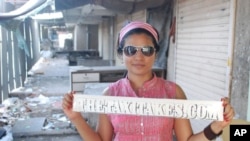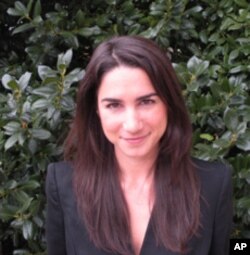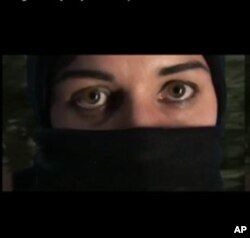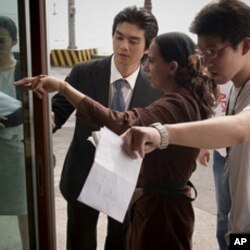An online competition is now open for what's being called the first-ever international showcase of short films about Islam and women.
The films focus on women of all faiths and backgrounds who are living in Muslim-majority countries, as well as Muslim women living as minorities around the world.
The festival's lineup hasn't been finalized yet. Digital film entries are still being accepted in an online competition that runs through November 24 of this year and is open to filmmakers of all genders and backgrounds.
Women's Voices Now
When human rights lawyer Catinca Tabacaru heard that someone was thinking about putting together a film festival about Muslim women, she knew she had to get involved.
So, in January 2010, Tabacaru joined with philanthropist Leslie Sacks and others to found Women's Voices Now, the non-profit organization behind "Women's Voices from the Muslim World - a Short-Film Festival."
The goal of the festival says Tabacaru, is to present an unbiased and comprehensive look at how women of all faiths, including Muslims, are asserting their rights both within and outside the Islamic world.
"There's so much work being done in Muslim majority countries and by Muslim women outside of those countries for women's rights," says Tabacaru. "There is a social movement happening and that's what we wanted to get behind."
Festival Open to all filmmakers
Filmmakers of all faiths and genders are invited to submit their films online. Once accepted into the competition, the films will first be reviewed and rated by web users and then officially voted on by a panel of judges.
By having the short films on line, people from all over the world will have a chance to watch them, comment on them, and even rate them.
As festival organizers select the film lineup, Tabacaru says they hope to present an unfiltered account of women's stories as well as highlighting women's voices from across the Muslim world.
"So what we're exploring are women, women's rights, women's achievements, expansion of women's rights. We're non-religious, we're non-political, but what we've created is a collection of films about women who in some way are touched by Islam. And that is new," she says.
It was especially important to her and the other festival organizers that some of the films focus on the positive contributions and accomplishments of Muslim women - and they do.
"We're very used to hearing about the Muslim woman as the victim, the oppressed, the veiled," she says. "What we're seeing through this film festival is that we're getting stories which we would have never dreamt of getting. They are about women doing things that, before doing this project, I would never have imagined."
Films about India
New York City resident Vandana Sood is a 30-year-old Indian-born artist who entered a film in the competition. Her 21-minute documentary, "The Taxi Takes: Women and Islam," is about a Muslim woman taxi driver in Mumbai, India, who candidly discusses the controversial issue of the burka, or veil, with her fellow passengers.
Sood says the festival has provided filmmakers like her with a unique opportunity to present a different perspective about Muslim women.
"I think that is incredibly empowering because mainstream media does tend to typecast and stereotype Muslims - and Muslim women in particular - under a certain garb and ideally this film festival will break some of those stereotypes."
Films about Iran
Alysse Stepanian is an Iranian-born Armenian who has been living in the U.S. for the past 30 years. Her film, "Roghieh," is based on dream journals she wrote about her experiences after the Iranian revolution of 1979.
While Stepanian herself is not a Muslim, she says growing up in a Muslim country helped her gain a lot of respect for the women there.
"When you look at a country like Iran, or the women in Iran, from someplace like America, people see it as very exotic, or they see it as dangerous or scary, but when you live in a place like that, you're just living there, it's your home and you're not afraid," she says.
Films from Afghanistan
Festival organizer Tabacaru says the response so far to the online film competition has been very positive.
Since the invitation to submit films online went out at the beginning of October, the festival has received entries from over 35 countries. Twenty six of the films are from Afghanistan alone.
"And this is one thing this festival does; it provides information and it provides a new and more complex and nuanced view of these women, which I hope will challenge perceptions and will challenge the way we are so typically used to relating to the Muslim world. Because I think it's very important to the future," she says.
Filmmakers interested in entering the competition can submit their films online at www.womensvoicesnow.org until November 24. Winning entries will be awarded cash prizes and be screened at the three-day film festival next March in Los Angeles, California.







